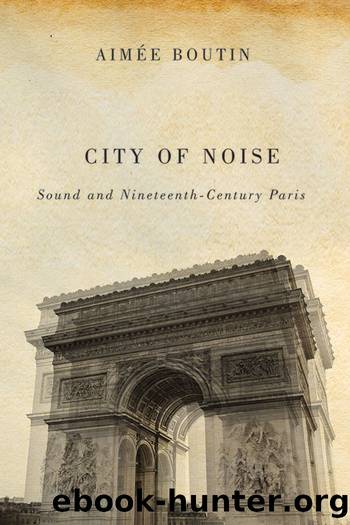City of Noise by Aimee Boutin

Author:Aimee Boutin [Boutin, Aimee]
Language: eng
Format: epub
ISBN: 9780252080784
Barnesnoble:
Publisher: University of Illinois Press
Published: 2015-05-06T00:00:00+00:00
The Demonic Effects of Stridency
The differences between the two poemsâ transpositions of the cry and circuits of communication tell us a great deal about how sound is conceived. Hous- sayeâs poem is grounded in the assumption that the sounds stand in for real things or people as properties of those sources, and accordingly the poem describes the subjectâs interactions with his surroundings. Instead of adopting a realist standpoint on sounds, Baudelaireâs poem explores the sensation of sound as a mental construct and the behaviors sounds elicit. It is interesting that the speaker invites speculation about the cryâs relationship to the crier by evoking, in the poem and in the dedicatory letter, the cityâs thick fog and dirty atmosphere that would make the crier hard to see but easy to hear. The sound the poet actually hears is less relevant than the effect the sound has on the listener. The opening of the poem sets the focus not on the material or substantive world, but on the mysteries of the mind, the âimpulsion mystérieuse et inconnueâ (1:285; âmysterious and unknown impulseâ [13]), the energy, the forces that motivate people to act. In fact, the digressive structure of the narrative, in which the story of the encounter with the glazier is delayed by a series of anecdotes about impulsive behaviors, should be read as a means of frustrating the process of interpretation.66
One of the forces in the poem that leads the speaker to act is the devil, who also appears in verse in Les Fleurs du mal, and who reflects Baudelaireâs strong interest in Edgar Allan Poeâs work. Demonic figures also make appearances in other prose poems such as âLes Tentations ou Ãros, Plutus et la Gloireâ (The Temptations, or Eros, Plutus and Fame) and âLe Joueur généreuxâ (The Generous Gambler). Baudelaireâs poem parodies the ambiguous content in Hous- sayeâs text. âLa Chanson du vitrierâ falls far from its apparent targetâto write a poem about Christian charity and fraternityâand instead conveys an implicit violence and cruelty, even Satanism, toward the working class.67 Like Mephistopheles, the narrator befriends his victim to secure his downfall. The satanic surfaces again as repressed content in Houssayeâs poem in the comparison of the glazier to Jesus Christ and Niccolò Paganini. On the one hand, Houssaye turns the glazier into a kind of Christic figure deprived of manna by the public, who is crucified at the hands of the bourgeois narrator; the more enigmatic comparison to Niccolò Paganini on the other hand could refer to the violinistâs extreme virtuosity that some thought resulted from a pact made with the devil.68
Moreover, in panoramic texts about the glazier and other street criers, allusions are made to the violent, fantastic, and sinister overtones of the cries. Indeed, street cries surface in childhood memories, which can easily be infused with superstitions dating back to times immemorial or with the fantastic and the magical. These associations are all the more powerful because criers are often heard in the early morning hours, while the
Download
This site does not store any files on its server. We only index and link to content provided by other sites. Please contact the content providers to delete copyright contents if any and email us, we'll remove relevant links or contents immediately.
Nudge - Improving Decisions about Health, Wealth, and Happiness by Thaler Sunstein(7690)
The Fire Next Time by James Baldwin(5431)
iGen by Jean M. Twenge(5408)
Adulting by Kelly Williams Brown(4565)
The Sports Rules Book by Human Kinetics(4379)
The Hacking of the American Mind by Robert H. Lustig(4375)
The Ethical Slut by Janet W. Hardy(4242)
Captivate by Vanessa Van Edwards(3838)
Mummy Knew by Lisa James(3686)
In a Sunburned Country by Bill Bryson(3536)
The Worm at the Core by Sheldon Solomon(3485)
Ants Among Elephants by Sujatha Gidla(3460)
The 48 laws of power by Robert Greene & Joost Elffers(3240)
Suicide: A Study in Sociology by Emile Durkheim(3017)
The Slow Fix: Solve Problems, Work Smarter, and Live Better In a World Addicted to Speed by Carl Honore(3006)
The Tipping Point by Malcolm Gladwell(2911)
Humans of New York by Brandon Stanton(2866)
Handbook of Forensic Sociology and Psychology by Stephen J. Morewitz & Mark L. Goldstein(2692)
The Happy Hooker by Xaviera Hollander(2686)
